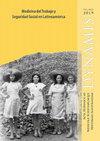哥伦比亚劳动领域心理技术的传播、流通和挪用(1940-1980)
IF 0.1
4区 哲学
Q3 HISTORY & PHILOSOPHY OF SCIENCE
引用次数: 0
摘要
这篇文章的目的是为哥伦比亚的行业心理学知识的历史做出贡献。为此,本文分析了梅赛德斯·罗德里戈(Mercedes Rodrigo, 1891-1982)为选拔人员而进行的第一次心理技术测试的实施情况,Cesar de马达里亚加(Cesar de Madariaga, 1891-1961)关于人类在工业中的理论的传播情况,以及心理技术在20世纪60年代至80年代之间的传播和使用情况。我们认为,与其他国家一样,心理技术在哥伦比亚成为一种检测劳动力能力的手段,也是在该国工业中寻求生产力的一种新的科学要求。我们还表明,减少事故和促进个人在工作中的福利并不是在哥伦比亚实施这些措施的主要原因。相反,它们最终成为克服纪律和生产力问题的工具,并成为在进口替代政策激增的情况下对男子进行建模和职业适应的技术。本文章由计算机程序翻译,如有差异,请以英文原文为准。
Difusión, circulación y apropiación de la psicotécnica en el ámbito laboral en Colombia (1940-1980)
The aim of this article was to contribute to the history of psychological knowledge in the industry in Colombia. For this purpose, an analysis was conducted of the implementation of the first psychotechnical tests for personnel selection purposes by Mercedes Rodrigo (1891-1982), the diffusion of theories about humans in industry by Cesar de Madariaga (1891-1961), and the circulation and appropriation of psychotechnics between the 1960s and 1980s are analyzed. We argue that, as in other countries, psychotechnics became a device in Colombia to detect labor aptitudes and a new scientific imperative in the search for productivity in the country’s industries. We also show that a reduction in accidents and the promotion of individual well-being at work were not the main reasons for their implementation in Colombia. On the contrary, they ended up being an instrument to overcome problems of discipline and productivity and a technique for the modelling of men and for occupational adaptations in the context of a surge in import substitution policies.
求助全文
通过发布文献求助,成功后即可免费获取论文全文。
去求助
来源期刊

Dynamis
社会科学-科学史与科学哲学
CiteScore
0.30
自引率
0.00%
发文量
0
审稿时长
>12 weeks
期刊介绍:
DYNAMIS is an international journal devoted to the history of medicine, health and science, founded in 1981, that pays special attention to novel and interdisciplinary historiographic perspectives. It offers original, double peer-reviewed research studies (articles, notes or documents) and reviews in languages of the European Union.
 求助内容:
求助内容: 应助结果提醒方式:
应助结果提醒方式:


